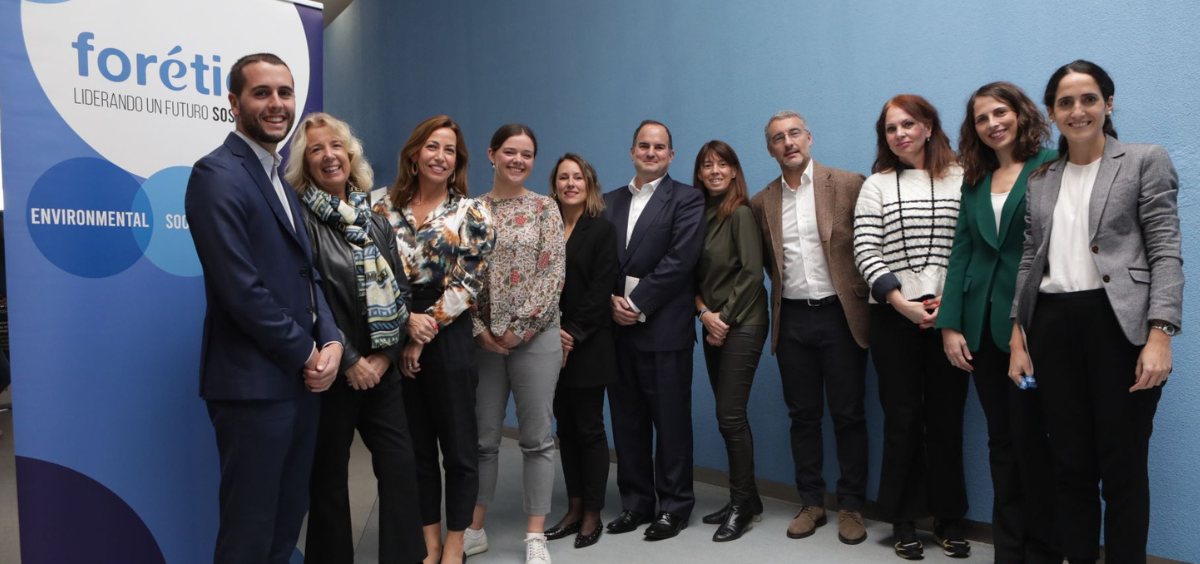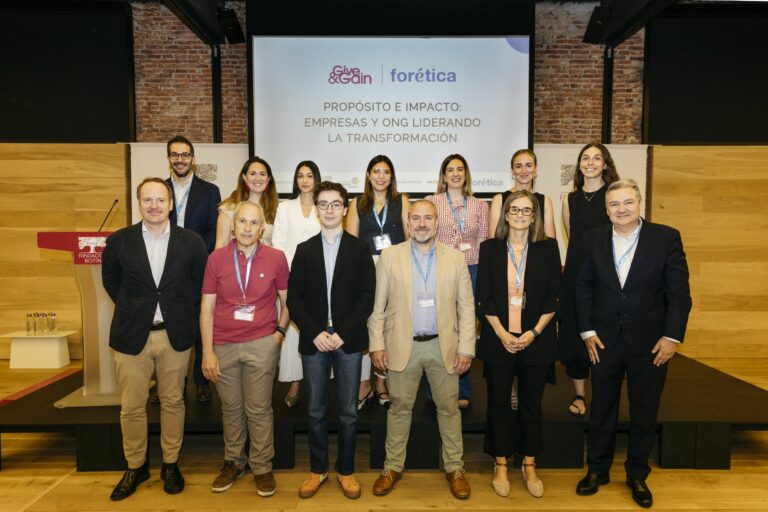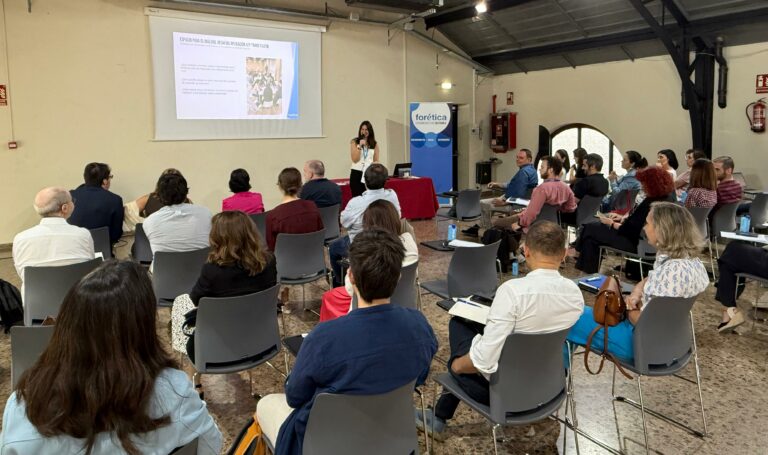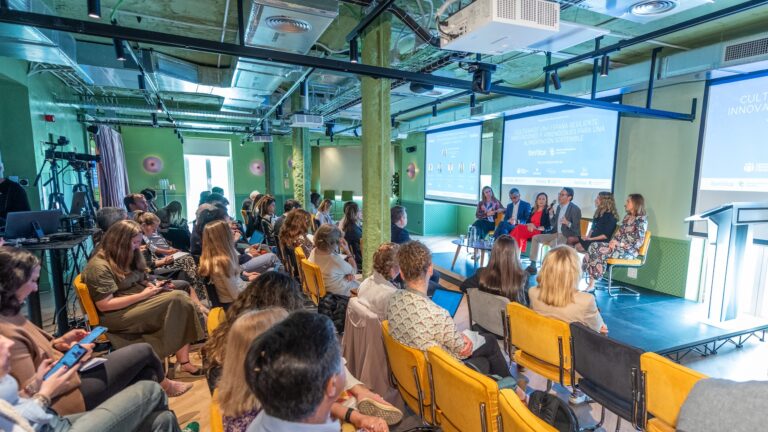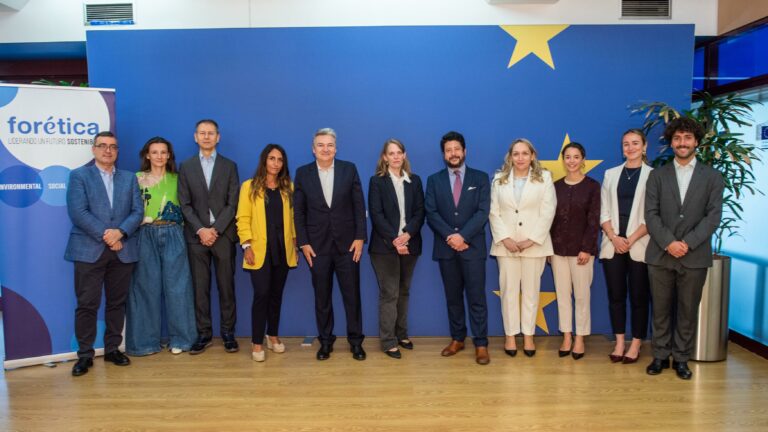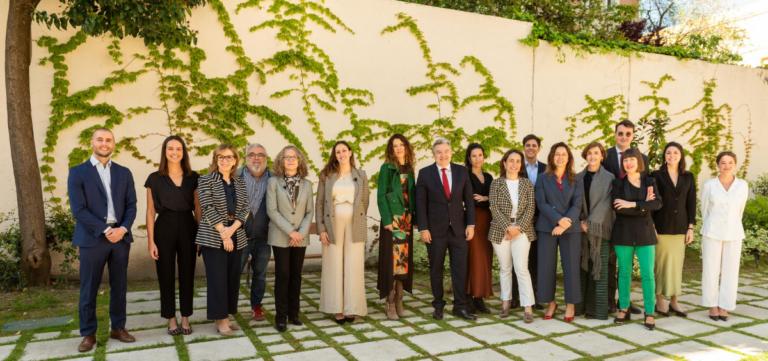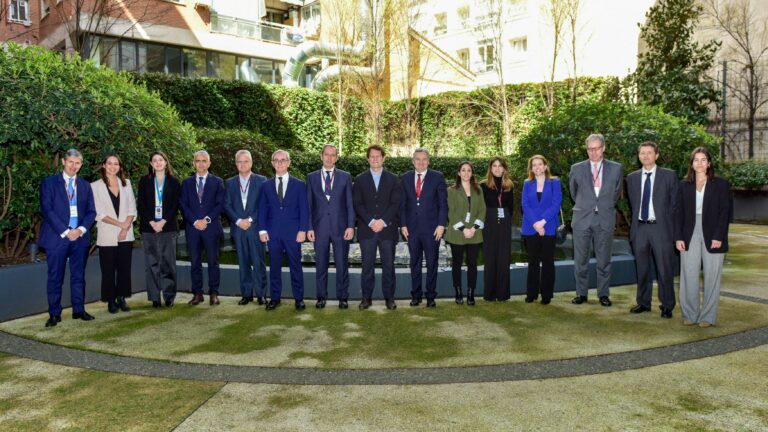- Forética presenta el informe ‘Movilidad sostenible. Construyendo ciudades climáticamente neutras’ en el marco de la iniciativa ‘Ciudades Sostenibles 2030’, con 25 empresas y entidades aliadas.
- El documento, presentado hoy en la Smart City Expo World Congress en Barcelona, identifica siete palancas clave para la transición hacia la movilidad sostenible basadas en la innovación, las oportunidades circulares y la colaboración con los distintos grupos de interés implicados.
- La iniciativa ‘Ciudades Sostenibles 2030’ busca potenciar la contribución empresarial para el desarrollo de ciudades sostenibles en España y poner en valor la importancia de la colaboración público-privada para lograr los Objetivos de Desarrollo Sostenible en los entornos urbanos (concretamente, el ODS 11), en alianza con organizaciones referentes a nivel nacional e internacional.
Forética ha organizado el foro ‘Ciudades net zero – el papel clave del sector privado’, en la Smart City Expo World Congress de Barcelona, en el que se ha presentado el informe ‘Movilidad sostenible. Construyendo ciudades climáticamente neutras’. El estudio analiza las principales palancas de cambio a nivel nacional, europeo e internacional que están impulsando la transición hacia una movilidad sostenible dentro de las ciudades para contribuir a cumplir el objetivo de la neutralidad climática en los entornos urbanos. Además, ofrece ejemplos de cómo las empresas españolas son actores indispensables en la contribución a este cambio.
Este encuentro se ha organizado en el marco de la iniciativa ‘Ciudades Sostenibles 2030’ -liderada por Forética y compuesta por un total de 25 empresas y entidades, encabezadas por CEMEX, ENGIE y Sanitas.
Como se ha resaltado en el foro, el desarrollo de una movilidad sostenibles dentro de las ciudades españolas es un elemento imprescindible en la lucha contra el cambio climático. Según datos del Ministerio para la Transición Ecológica y el Reto Demográfico, el transporte en España supone un 27% del total de emisiones de gases de efecto invernadero.
Como se está destacando estos días en la COP27 sobre Cambio Climático que se está celebrando en Egipto, a través del impulso de medios de transporte sostenible estas emisiones pueden reducirse, generando un impacto positivo en la salud y bienestar de las personas que habitan las ciudades y sobre el medio ambiente en general. Por ejemplo, de acuerdo con el World Economic Forum, con la electrificación del transporte urbano las ciudades pueden ayudar a mitigar más del 70% de las emisiones de CO2, reduciendo el 50% de la contaminación del aire.
Ana Herrero, Directora de Proyectos y Servicios de Forética, afirma: “Resulta evidente la necesidad de un cambio de paradigma en el transporte hacia un modelo sostenible que implica no solo un reto, sino una gran oportunidad que trae consigo importantes beneficios económicos, ambientales y sociales. En este sentido, el impulso de un transporte eficiente, limpio, accesible y seguro, constituye una de las nueve rutas de transformación empresarial que se incluyen en la hoja de ruta ‘Visión 2050’, presentada por Forética en el marco del Consejo Empresarial Español para el Desarrollo Sostenible”.
El informe publicado en el marco de la iniciativa ‘Ciudades Sostenibles 2030’ destaca siete palancas clave para la transición hacia la movilidad sostenible: la innovación en baterías y combustibles bajos en carbono, el desarrollo y planificación de infraestructuras, la diversificación de soluciones de movilidad, las oportunidades circulares del sector del transporte, la implementación de vehículos autónomos, el uso compartido de datos y el esfuerzo conjunto de los distintos grupos de interés implicados.
Como destaca el estudio, la movilidad al trabajo representa en España el motivo mayoritario de desplazamiento de particulares. Según datos del Observatorio de la Movilidad Metropolitana en España -analizados por Forética en el informe- se estima que, por motivo de trabajo y estudios, los viajes en coche y moto suponen un 62% de media, mientras que los viajes en transporte público tan solo un 13%. Cada empleado que teletrabaje evita la emisión de 599 kg de CO2 al año.
Forética ha complementado este informe con un documento sobre la contribución empresarial a las ciudades climáticamente neutras, en el que se explican los 7 elementos claves de la Misión europea ‘Ciudades inteligentes y climáticamente neutras’ y se ordenan en función de su grado de contribución por parte del sector privado. En él, se pone de manifiesto cómo las empresas son fundamentales en el desarrollo de los planes de inversión sostenible, los acuerdos climáticos, y los planes de acción de I+D+i, entre otros elementos de las ciudades climáticamente neutras.
La movilidad sostenible: reto y oportunidad para las empresas
Como destaca Patricia Rodríguez, Manager de la iniciativa ‘Ciudades Sostenibles 2030’ de Forética: “La colaboración público-privada es fundamental para poder desarrollar una movilidad sostenible en nuestras ciudades. Las administraciones públicas lideran esta transformación mediante la regulación existente y a través de incentivos fiscales y económicos. Los actores privados, por su parte, son los encargados de materializar estas ideas e innovar para poder hacerlas realidad. La implicación de las empresas en esta transición hacia una movilidad sostenible es imprescindible, para poder alcanzar el objetivo de ciudades climáticamente neutras, tal y como destacamos en el análisis concreto que también presentamos sobre las claves de la Misión europea impulsada con el objetivo de alcanzar cien ciudades climáticamente neutras para 2030.
Las claves de la Misión europea ‘Ciudades inteligentes y climáticamente neutras’ han sido explicadas por Patrick Child, Director General Adjunto de la DG Medio Ambiente de la Comisión Europea y Manager de la iniciativa. Por su parte, Emily White, City-Business Climate Alliance & UrbanShift Manager de C40, ha trasladado las tendencias globales más destacadas en materia de colaboración público-privada en el ámbito de la sostenibilidad urbana.
Desde la perspectiva local, se ha contado con la intervención de la Consejera de Servicios Públicos y Movilidad del Ayuntamiento de Zaragoza, Natalia Chueca Muñoz.
Asimismo, en la sesión han intervenido representantes de las empresas que lideran la iniciativa ‘Ciudades Sostenibles 2030’, explicando sus enfoques en materia de movilidad sostenible desde sus diferentes sectores. Concretamente, se ha contado con la intervención de Marcelo Catalá, VP Urbanization Solutions EMEA de CEMEX; David Liste, Director de Energy Solutions de ENGIE España; y Lucia Carrio, Head of Corporate Responsibility and Sustainability de Sanitas.
La iniciativa está liderada por Forética y compuesta por un total de 25 empresas y entidades, encabezadas por CEMEX, ENGIE y Sanitas. En dicha iniciativa también participan Accenture, Adif, Enagás, Endesa, FCC, Ferrovial, GSK, IBM, LafargeHolcim, Mahou San Miguel, MAPFRE, Metro Ligero Oeste, Metrovacesa, Naturgy, Reale Seguros, Sacyr y Urbaser.
Como aliados, forman parte de la iniciativa a nivel global el World Business Council for Sustainable Development (WBCSD), a nivel nacional la Fundación CONAMA y a nivel local el Foro de Empresas por Madrid, el proyecto Madrid Nuevo Norte y la asociación Madrid Capital Mundial de la Construcción, Ingeniería y Arquitectura. Asimismo, Forética mantiene alianzas estratégicas con encuentros de relevancia internacional en este ámbito como la Smart City Expo World Congress o el Foro de las Ciudades, en sus distintas ediciones.
En la primera edición de la iniciativa ‘Ciudades Sostenibles 2030’, Forética publicó el informe ‘Replanteando nuestras ciudades. Hacia un nuevo modelo de desarrollo urbano sostenible’, que identifica seis palancas de acción hacia un modelo de ciudad más sostenible e inclusiva en el contexto de recuperación post COVID-19. Concretamente en materia edificación como una de estas palancas, Forética publicó el informe ‘La construcción sostenible. ¿Por qué es clave para la recuperación verde de las ciudades?’, que analiza los tipos de soluciones y respuestas sostenibles de las empresas del sector construcción.
Además, en su trayectoria sobre Ciudades Sostenibles, Forética cuenta con proyectos como la ‘Caja de herramientas para la adaptación al cambio climático en ciudades’, en colaboración con la Fundación Biodiversidad del Ministerio de Transición Ecológica y el Reto Demográfico, orientada a los ayuntamientos a nivel nacional para desarrollar sus estrategias y acciones de adaptación al cambio climático. También el proyecto ‘Vida Sostenible en Ciudades’, que contó con la colaboración de la Federación Española de Municipios y Provincias (FEMP) y de la Oficina Española de Cambio Climático del Ministerio para la Transición Ecológica y el Reto Demográfico.

